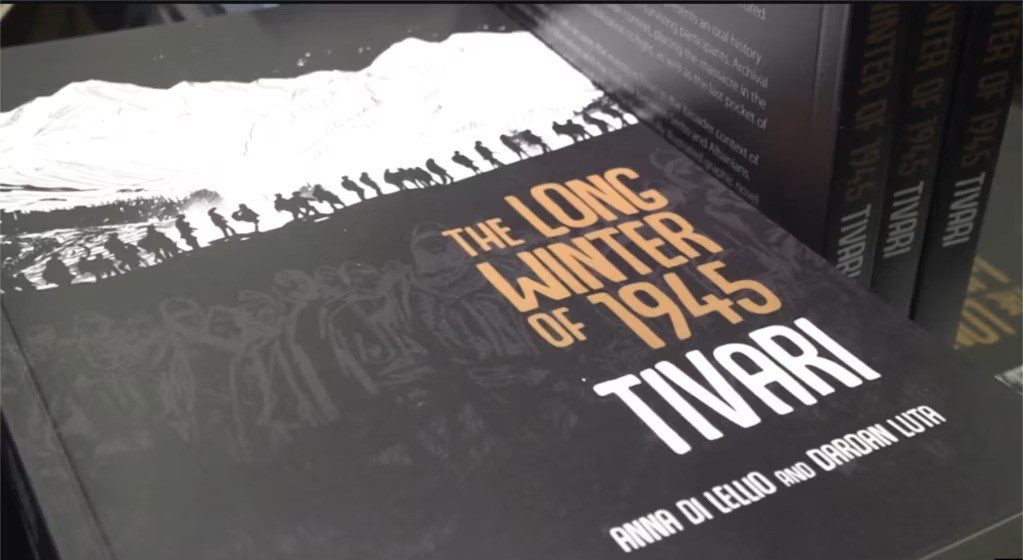At New York University, the English language edition of the book “The Long Winter of 1945” was presented to the American public, authored by Italian sociologist Anna Di Lellio and Kosovar artist Dardan Luta.
The English-language book, enriched with even more details, sheds light on a grave event at the end of World War II, known as the Tivar Massacre, where Serbian forces killed hundreds of unarmed Albanians from Kosovo.
Through the story of ten men from a village in Drenica, who managed to survive the Tivar massacre, the English publication of the book titled “The Long Winter of 1945” brings to the American reader one of the most severe events in Albanian history at the end of World War II.
Seventy-eight years ago, hundreds of young and unarmed men from Kosovo, called up for military mobilization by the authorities of former Yugoslavia to fight the Nazis, were killed by Serbian forces in Montenegro.
Much work is still needed to fully illuminate this event, says author Anna Di Lellio, but she adds that books with stories like this are essential, especially now when the world is facing two major wars, that of Russia in Ukraine and the Israel-Hamas conflict in the Gaza Strip.
“People continue to repeat the same actions. I think it’s important that this book comes now, a reminder that massacres should not be forgotten. The dead have weight for the history of a country. Their memory is preserved generation after generation. The work of historians aims not only to prevent the suppression of history but also to understand it, to talk about it, to seek forgiveness or to atone for sins if necessary. We should not forget the dead. It’s better to remember them openly, through civilized discussions. To understand what happened to those people, because they are not just numbers,” says author Di Lellio to Voice of America.
Dr. Shinasi Rama from the International Relations program at New York University says that through such publications, people learn from the past how to solve current problems. “We must pay attention to history because what is happening today is yesterday’s history. Thus, what happens today becomes history tomorrow. We need to preserve the meaning of truth and values, related to what is happening. Because the clearer we have the phenomenon that is happening, the better we will be able to deal with that problem and with people in the future,” says Dr. Rama to Voice of America.
The book is based on the oral testimonies of survivors and their families, archival documents, and historical research.
In this publication, the events are narrated with little text and illustrations by Kosovar artist Dardan Luta, who is also a co-author of the book. The aim of this format is to reach younger readers.
“The story is very touching. In fact, my society, which has seen the book, has no knowledge of Albania or Kosovo. But they were very moved by this story. We made the book for younger generations, but even the elderly like it because it is easy to read. Through images, we convey the very tragic and traumatic emotion of this story much better,” says author Di Lellio.
This creative way of unfolding history should also be used to illuminate other events of the past, says Hunter College history professor Dr. Elidon Mëhilli.
“It raises the question of the platform, what is the right method to bring it, to put the reader, especially a new generation, in contact with the past and history, and to demystify the process of writing history based on documents and testimonies, to make it more tangible as a process. There is much work to be done by authorities and the research infrastructure in the Albanian-speaking world, whether in Albania, Kosovo, or other lands where Albanians live, to not be limited only to that narrow national or regional worldview, but to create a register, to speak, even with newer ways, methods, technologies,” says Mr. Mëhilli to Voice of America.
Dr. Rama agrees, while speaking about the necessity for young Albanian readers, despite facing a dynamic life, to learn about their past.
“In this effort to earn a living, in the race to move forward, we are forgetting and overlooking precisely what is very important to us – who we are, where we come from, and where we are going. Where we will go is largely determined by where we have been,” says Mr. Rama.
The English version is published by the Canadian University “Toronto Press” and will use it as an example to explain to his students a way how historical research can be done.
The Albanian-language publication of this book was presented to the public in Kosovo in March 2019./VOA








